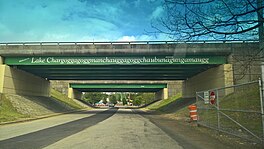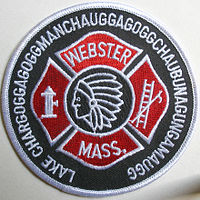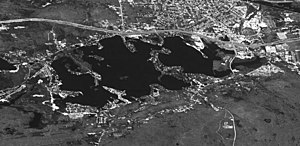geo.wikisort.org - Reservoir
Lake Chaubunagungamaug, also known as Webster Lake, is a lake in the town of Webster, Massachusetts. It is located near the Connecticut border and has a surface area of 1,442 acres. Since 1921, the lake has also been known by a much longer name having 45 letters comprising fourteen syllables: Lake Chargoggagoggmanchauggagoggchaubunagungamaugg. The lake has become famous beyond Central Massachusetts for having the longest name of any geographic feature in all of the United States.
| Lake Chaubunagungamaug | |
|---|---|
| Webster Lake | |
 Name of the lake on a bridge | |
 Lake Chaubunagungamaug  Lake Chaubunagungamaug | |
| Location | Webster, Massachusetts |
| Coordinates | 42°02′30″N 71°50′30″W |
| Basin countries | United States |
| Max. length | 3.25 mi (5.23 km) |
| Max. width | 1.125 mi (1.811 km) |
| Surface area | 1,442 acres (584 ha) |
| Shore length1 | 17 mi (27 km) |
| Surface elevation | 477 feet (145 m) |
| Islands | 8 |
| 1 Shore length is not a well-defined measure. | |
Name
The lake's name comes from Loup, an Algonquian language,[citation needed] and is often said to mean, "Fishing Place at the Boundaries—Neutral Meeting Grounds".[1] A more fitting translation is "lake divided by islands", according to anthropologist Ives Goddard.[2]
Today, "Webster Lake" may be the name most used, but some (including many residents of Webster) take pride in reeling off the longer versions. This lake has several alternative names. Lake Chaubunagungamaug is the name of the lake as recognized by the U.S. Department of the Interior,[3] and is the name appearing in the earliest local records.[2]
Algonquian-speaking peoples had several different names for the lake as recorded on old maps and historical records. However, all of these were similar in part and had almost the same translation. Among other early names were "Chabanaguncamogue" and "Chaubanagogum".[4] Early town records show the name as "Chabunagungamaug Pond", which was also the name of the local Nipmuc town (recorded in 1668 and 1674 with somewhat different spellings). This has been translated as "boundary fishing place",[5] but something close to "fishing place at the boundary" or "that which is a divided island lake" may be more accurate.[6]
A 1795 map of Massachusetts indicated the name, using the long-form's first eight syllables, as "Chargoggagoggmanchoggagogg".[7] A survey of the lake done in 1830 lists the name as "Chaubunagungamaugg", the six-syllable older name. The following year, both Dudley and Oxford, which then adjoined the lake, filed maps listing the lake by its eight-syllable form, as "Chargoggagoggmanchoggagogg".[4] Anthropologist Ives Goddard considers that 1831 name to be a cartographer's creation that corrupted the actual name while confusing this lake with nearby Manchaug Pond.[2]
Long name
The exaggerated name "Lake Chargoggagoggmanchauggagoggchaubunagungamaugg" (/ˌleɪk tʃɚˈɡɒɡəɡɒɡ ˌmænˈtʃɔːɡəɡɒɡ tʃəˌbʌnəˈɡʌŋɡəmɔːɡ/)[8][9] is a 45-letter alternative name for this body of fresh water, often cited as the longest place name in the United States[10] and one of the longest in the world. Many area residents, as well as the official website of the town of Webster, consider the longer version correct.[11]

The humorous translation is: "You fish on your side, I'll fish on my side, and no one shall fish in the middle". Its humorous translation was perhaps invented by Laurence J. Daly, editor of The Webster Times.[1][12] According to Ives Goddard, Curator of Anthropology at the Smithsonian Institution, Daly created this "monstrosity" around 1921, though this is probably not correct, as the name was in use as early as c1910 on postcards.[2]

Spellings of the long name vary; in 2009, following six years of press reports, the local Chamber of Commerce agreed to have the spelling changed on its signs, but a 45-letter version of the name arrayed in a semicircle is still used.[13] Webster public schools use one long form of the name in various capacities.[4][14]
Geography

Webster Lake is a 1,442-acre (5.84 km2)[15] lake with a 17-mile (27 km) shoreline in southern Massachusetts, near the Connecticut border. It is the third largest fresh body of water in Massachusetts, after slightly larger Long Pond, and the much larger Quabbin Reservoir. The average depth is 13 feet (4.0 m) and the maximum depth is 49 feet (15 m).[16]
Although the lake is natural in origin, its outlet has a dam that raises the water level by roughly 2 feet (0.61 m).[17] The dam initially provided water for a mill, and subsequently the water rights to the lake were owned by Cranston Print Works; currently, the dam is owned by Webster Lake Preservation LLC.[17]
The lake is commonly divided into three smaller bodies of water: North Pond, Middle Pond, and South Pond. They are connected by narrow channels.[17]
Islands
Webster Lake has about 7–8 islands. Some have houses and are habitable; a few are extremely small and uninhabitable. They include:
- Long Island: The largest island in Webster Lake. It has many homes and has electric power lines, underground/underwater municipal water and sewer service, and several fire hydrants. It is in the Middle Pond.
- Goat Island: The second largest island. It has a few homes and boats. It is in the Middle Pond but isolated from the cluster of islands that include Long Island.
- Well Island: A smaller island with one house west of Long Island in the Middle Pond.
- Strip Island: Generally northeast of Long Island and north of Cobble Island with one house, also in the Middle Pond.
- Cobble Island: East of Long Island, in the Middle Pond.
- Little Island: In South Pond, right out of the no wake zone from the Middle Pond, one house.
- Birch Island: Large island on west edge of Middle Pond with Pout Pond on west side and swamp surrounding entire island. It is located roughly between Treasure Island and The Narrows with access by a bridge on Birch Island Road near The Narrows. There are many homes on island and establishment once called Birch Island Pavilion, now called Waterfront Mary's.
- Small island near east side of Narrows in Middle Pond. May be called either Misery Island or Skunk Island, depending on the map.
Marinas
Webster lake has two marinas:
- Lakeview Marine: The only full-service marine store and service shop on Webster Lake.
- Point Breeze: A restaurant with a small marina. Point Breeze Marina has the only dockside gas pump on the lake.
In popular culture
In the 1950s, a plan to shorten the official name of the lake inspired a poem of doggerel verse which concludes:
"Touch not a g!" No impious hand
Shall wrest one from that noble name
Fifteen in all their glory stand
And ever shall the same.
For never shall that number down,
Tho Gogg and Magogg shout and thunder;
Chargoggagoggmanchauggagoggchaubunagungamaugg's renown
Shall blaze, the beacon of the town,While nations gaze and wonder.[18]
Three songs about the lake's name have been written. The first was a regional song from the 1930s. The second, "The Lake Song (Chargoggagoggmanchauggagoggchaubunagungamaugg)" was recorded by Ethel Merman and Ray Bolger and released in 1954 by Decca and incorporates the tale about the lake's name according to the name's inventor, Laurence J. Daly, editor of The Webster Times. The most recent was released in 2010 by Diane Taraz.
The lake is referenced in season 6, episode 6 of Gilmore Girls, "Welcome to the Dollhouse." The character Kirk says, "[It is] an old Nipmuc Indian name. It means you fish on your side of the lake, I'll fish on my side, no one fishes in the middle. Or maybe it means Buffalo."
See also
- List of long place names
- Longest word in English
- Taumatawhakatangihangakoauauotamateaturipukakapikimaungahoronukupokaiwhenuakitanatahu, the longest place name in New Zealand, and the world
- Llanfairpwllgwyngyllgogerychwyrndrobwllllantysiliogogogoch, the longest place name in the UK
- Longest words
- Chaubunagungamaug Nipmuck
- Chaubunagungamaug Reservation
References
- Patenaude, Ed (June 28, 2001). "Fabrication leaves us gasping - Old twist to name of lake comes to light". Worcester Telegram & Gazette. Archived from the original on July 23, 2003. Retrieved May 31, 2011.
- Goddard, Ives. "Time to Retire an Indian Place-Name Hoax", The New York Times (Letter to Editor; September 29, 1990).
- "Lake Chaubunagungamaug". Geographic Names Information System. United States Geological Survey, United States Department of the Interior. Retrieved April 14, 2011.
- Old Webster History, from the Webster TIMES Centennial Anniversary Issue, 1859-1959.
- Trumbull, James Hammond. 1881. Indian Names of Places etc., In and On the Borders of Connecticut: With interpretations of Some of Them. Reprinted in facsimile 1974 under title Indian Names in Connecticut by Archon Books, Hamden, Conn.
- Goddard, Ives. 1974. Untitled review of Trumbull in International Journal of American Linguistics Vol. 43, No. 2 (Apr., 1977), pp. 157–159, University of Chicago Press.
- Osgood, Carleton (1795). "An accurate map of the Commonwealth of Massachusetts..." Boston Public Library.
- "AUDIO: Singing a Name That's Hard to Say", New York Times (November 19, 2004).
- "OldeWebster Photo Archive" Archived December 13, 2007, at the Wayback Machine (Accessed September 16, 2015).
- Ash, Russell (November 10, 2011). Boring, Botty and Spong. RHCP. p. 68. ISBN 978-1-4090-9739-6.
- Town of Webster, accessed January 15, 2007.
- Knapton, Sarah (April 22, 2009). "Longest Place Name in US Spelt Wrongly". The Telegraph. London. Retrieved March 28, 2012.
- Brian Lee (April 14, 2009). "Misspelling on Lake Signs to Get Overdue Correction". Worcester Telegram & Gazette.
- Nipmuc Place Names of New England
- "Webster Lake", Division of Fisheries and Wildlife, Commonwealth of Massachusetts (February 1998), via Archive.org
- "Webster Lake Cyanobacteria Investigation: Phase I" Archived March 4, 2016, at the Wayback Machine, Prepared by Water Resource Services, Inc., for the Webster Lake Association (November 2014).
- "About Webster Lake" Archived May 21, 2019, at the Wayback Machine, Webster Lake Association. Accessed September 6, 2015.
- Poem by Bertha A. Joslin Archived August 15, 2020, at the Wayback Machine.
External links
- A history of the lake
- NY Times - What's the Name of That Lake? It's Hard to Say
- Listen to the Lake Song
- Webster Lake Real Estate Boat Tours
- MassWildlife Map and Info
- Map of the area watershed
- Lake Chaubunagungamaugg photos 1
- Lake Chaubunagungamaugg photos 2
На других языках
[de] Lake Chaubunagungamaug
Der Lake Chaubunagungamaug (auch Webster Lake, Chargoggagoggmanchauggagoggchaubunagungamaugg und etliche weitere inoffizielle Namen) ist ein See östlich von Webster im US-Bundesstaat Massachusetts – rund 70 km südwestlich von Boston unweit der Staatsgrenze zu Connecticut gelegen. Der relativ unbedeutende See ist für seine zahlreichen Alternativnamen bekannt, von denen einer die längste Ortsbezeichnung in den Vereinigten Staaten von Amerika darstellt.- [en] Lake Chaubunagungamaug
[es] Lago Chaubunagungamaug
El Lago Chaubunagungamaug, también conocido como Lago Webster, es un lago ubicado en Webster, Massachusetts, Estados Unidos.[it] Lago Chaubunagungamaug
Il lago Chargoggagoggmanchauggagoggchaubunagungamaugg (pronunciato /ˌleɪk tʃəˈɡɒɡəɡɒɡ ˌmænˈtʃɔːɡəɡɒɡ tʃəˌbʌnəˈɡʌŋɡəmɔːɡ/), in breve lago Chaubunagungamaug (pronunciato /tʃəˌbʌnəˈɡʌŋɡəmɑːɡ/) è un lago statunitense situato nella città di Webster nel Massachusetts nei pressi del confine con il Connecticut, da cui dista il punto più meridionale solo 200 m.[ru] Чаубунагунгамауг
Чаубунагунгамауг (англ. Chaubunagungamaug), также известно как Вебстерское озеро (англ. Webster Lake) — озеро в Северной Америке, расположено рядом с городом Вебстер, штат Массачусетс, США. Площадь озера составляет 5,83 км².Другой контент может иметь иную лицензию. Перед использованием материалов сайта WikiSort.org внимательно изучите правила лицензирования конкретных элементов наполнения сайта.
WikiSort.org - проект по пересортировке и дополнению контента Википедии